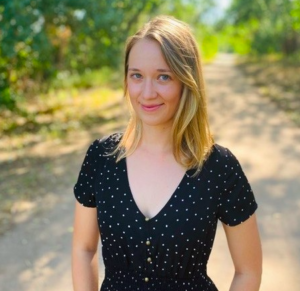ANNA LEIGH KNOWLES, FEATURED IN THE NEW OCEAN STATE REVIEW
Interior Lives
Autumn already. The boxwood
out front blazes like a candy-
streaked tongue. Two metal
columns frame the front door
no one uses. I’ve never seen
a boxwood so bright. Shreds
of canopy heave above
like hymnbooks. Is it pain?
A rapture? A child stands
in the doorway, a girl. Nothing
behind her but blackness. Her hip
knocks to the side. I want so much
to see her face, eyelids blue and shining
under porchlight. Her hair, brittle
as pine needles, red as stream-side
reeds. She stands there in no-
space, a pale opening in memory
while the trident of trunk strikes
up offering a place to hang
my questions. Why must the wayward
insist on epiphany? Why this entry
into the beyond if not to mean
my instincts are correct,
and my family spreads out the most
when searched for? The girl,
I believe, is my great aunt. She holds
the front door open not to usher
me in, but to confirm who stands
there. Me—a diorama of hums
and twitches. I can smell
the rain, its musty yawn as door
hinges bend between me and cool
depths of interior lives. I was thirteen
when she saw my first blood
at the family picnic, covered
my waist in her white sweater
and walked behind me into this house.
I sat inside and ate my crackers.
Twenty years will pass before
I remember that moment
in another year that slips away
from ledgers and has no resolve.
Had I entered the afternoon
in its grey-slacked breeze
where she stood in the open
door, her hand, formless, swirling
into a dense blue disc, I would not
tell her about the deaths to come,
the expanding years already
silvering her young face. I would not
interfere with the natural order
of things. But I want to tell her
to let go of the door and come
where the day still hangs in ruby
suspension of heat and vibrancy.
I want to say your siblings will die
not in the order you expect but of course,
she is not expecting any of it, not yet.
Instead, she considers me the way
someone considers snowfall. The way
the passing of one body in motion
leaves parts of itself everywhere.
Anna Leigh Knowles on “Interior Lives“:
This poem was written after I moved overseas for the second time and was feeling very uprooted. I had a file on my computer of family photos that was transferred to me by a family member, and I loved going through them for hours in an attempt to ground myself to a specific time and place, but to also distract from the vast changes my life required. In doing so, I ended up writing a lot of ekphrastic poetry. This poem was one of several that came from that period. Ironically, the generation of these ekphrastic poems, this one included, helped me realize that the place I was attaching myself to no longer existed, so I was living in a very transient space that led to questioning my role in many of my relationships. This poem helped me see myself in a photo that wasn’t really about me, but about a time that embodied a version of myself I wanted to return to.
Anna Leigh Knowles is the author of Conditions of The Wounded (Wisconsin Poetry Series, 2021). Her work appears in Blackbird, Indiana Review, Memorious, The Missouri Review Online, Poetry Northwest, RHINO, storySouth, Hunger Mountain, Sou’wester, Thrush Poetry Journal, and Tin House Online. A recipient of an Illinois Arts Council Agency Award, she has also received scholarships from the Appalachian Writers’ Workshop, Bear River Writers’ Workshop, the New Harmony Writers’ Workshop, the San Miguel de Allende Writers’ Conference, and a Female Leadership Residency at Omega Institution. She worked as an assistant editor for the literary journals Copper Nickel and Crab Orchard Review. She holds an MFA from Southern Illinois University-Carbondale and a BA from University of Colorado-Denver. She currently teaches in Denver.

